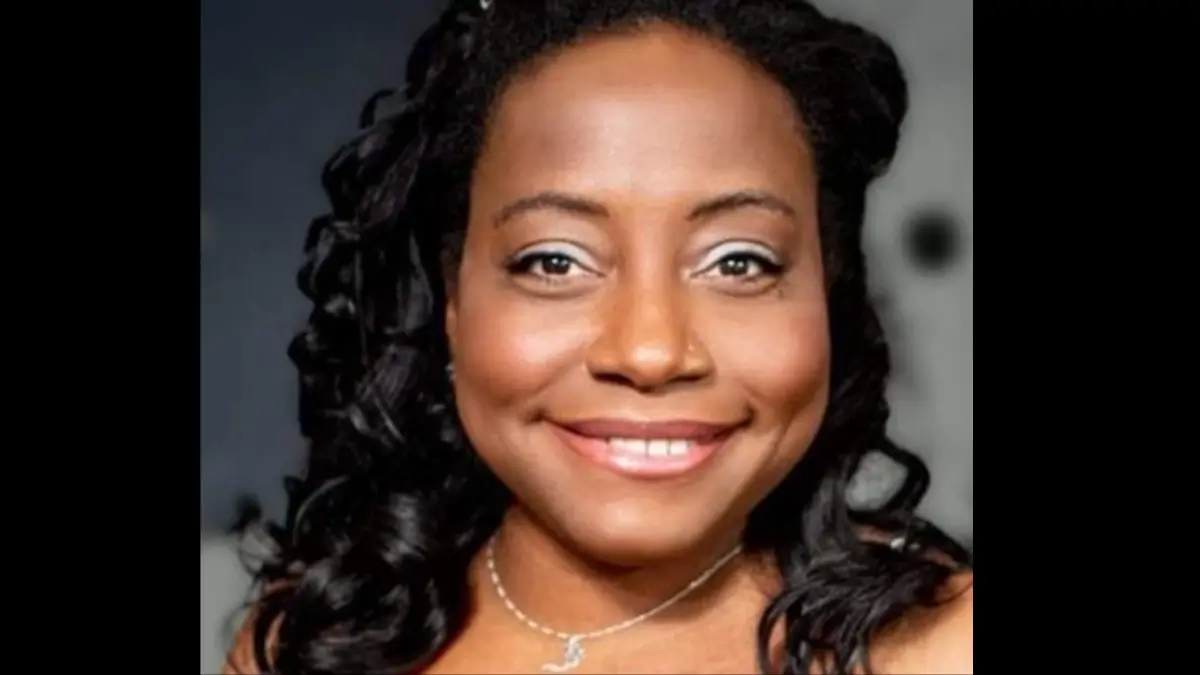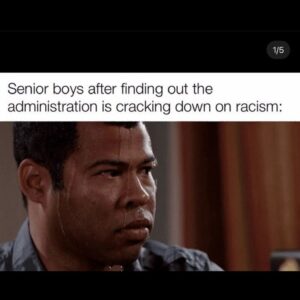When she learned her biracial son had been harassed with racial slurs at his predominantly white Fort Collins, Colorado, high school six months into his sophomore year, Stephanie Watson Lewis asked for a meeting with the school principal.
In late January, she told Principal Robert Robinson that more than a dozen students had called her son, then a 16-year-old sophomore, the “n-word,” “monkey,” and other slurs almost daily since the second week of school. The students also said he “belonged in a cage” and that he must “like watermelon and fried chicken.”
Watson Lewis, who is Black, told the principal of another instance where a student reportedly dropped to their knees in front of her son and mockingly said, “Black Lives Matter.”

Her son had transferred into Liberty Common High School in 2023 after his father, who is white, was hired as an IT administrator at the public charter school, known for its rigorous academics and “classical” college prep curriculum.
While he had begun the school year a bit nervous about taking on a more challenging course load and trying out for the varsity soccer team, by the start of the second semester, her son had developed severe anxiety about going to school at all, Watson Lewis told Atlanta Black Star. She made it clear to the principal that her son, as well as she and her husband, wanted the racial harassment to stop.
Robinson was receptive to her complaints, Watson Lewis said, but the actions that he and other school officials took did not improve the situation for her son, who continued to face regular harassment from his white peers.
Unsatisfied with the school’s response, on Feb. 8, Watson Lewis filed a racial discrimination complaint against both Liberty Common School, a public charter school, and the Poudre School District with the Office For Civil Rights (OCR) at the U.S. Department of Education, which conducted an investigation over several months.
Liberty Common operates two Kindergarten through sixth-grade schools on two different campuses in Fort Collins and a high school for students in grades 7-12. Black and multiracial students made up 5.9% of its total enrollment of 544 students in 2023-24, according to Colorado Department of Education data.
On Sept. 3, the OCR issued a 13-page letter to Watson Lewis, Robinson and other parties involved in the investigation, which included interviews with students, teachers, parents, and school administrators, as well as a review of school records. It refers to her son as “the Student,” withholding his name to protect his privacy, as is Atlanta Black Star.
In the letter, the Office of Civil Rights said it had found by “a preponderance of evidence” that the school “failed to take prompt or effective action to stop severe and pervasive peer harassment of the Student based on race at the school, to eliminate a known racially hostile environment for the Student, or to remedy its effects on the Student.”
It said evidence revealed that “at least four students, and allegedly, many more” had harassed the boy multiple times during the 2023-24 school year in a variety of school settings, including when they called him “jigaboo,” “mocked the murder of George Floyd” in front of him, and on multiple instances used “the n-word,” including occasions when white students asked him “for an n-word pass.”
School staff did not adequately investigate or investigate at all incidents of peer harassment of the student based on race, the letter said, including when teachers and the principal received explicit reports and complaints from the student and his mother or when they witnessed racial incidents themselves.
OCR’s investigation found that on Jan. 30, two white boys who admitted to the principal they had made racial comments toward the Student, referring to him “as a monkey in the context of jokes,” were disciplined by spending an in-school research day learning about the school’s “capstone virtues” for character education, writing about how their conduct was inconsistent with the virtues, and then discussing it with the principal at the end of the day.
Robinson wrote to Watson Lewis that “the resulting conversations and consequences seemed productive and likely to lead to changes in behavior.”
They did not. One of the students called her son “jigaboo” that same day, she said. She emailed Robinson about it, but he later told OCR he declined to further investigate since “he had already spoken with [the white student] about racially harassing the Student.”
In another instance, a teacher overheard a white student say, “It’s getting dark in here,” in reference to the Student, which she thought was “racially motivated.”
The teacher told OCR investigators that she told the offending student that such comments were not appropriate, but she did not document the incident or report it to the school’s administration at the time. Later, when the principal learned about the incident, he did not speak with either the offending or victimized student about it. He also did not discipline the teacher, whom he said “had already handled the incident” and “did nothing wrong.”
During a high school staff meeting on Jan. 31, the headmaster (and school founder) Bob Schaffer, a former Republican state senator and U.S. congressman in Colorado, and Principal Robinson held a meeting to emphasize the school’s bullying and non-discrimination policies, including the staff reporting requirements.
Robinson asked teachers to raise their hands if they had heard anything related to racial harassment of the Student. Two teachers raised their hands.
One told the principal and later OCR that while grading papers at her desk in December 2023, she’d overheard a student say in a school hallway, “I can’t breathe! I can’t breathe! … [the Student’s name], did you hear that?” The teacher said she went into the hallway but didn’t see who made the comment and let it drop. She never talked to the Student or any other students about it.
“At least three teachers knew about this harassment of my son and didn’t report it to the administration,” said Watson Lewis, who works for a nonprofit as an advocate for people with intellectual and developmental disabilities, including students in public and private schools. “They are mandatory reporters, and they did nothing. It’s infuriating.”
Watson Lewis said some of the white students made light of the dialogue about racial harassment coming from school officials, which was not accompanied by real punishment.
One student posted on a student Instagram account a meme of Black actor Jordan Peele profusely sweating, with the caption, “Senior boys after finding out the administration is cracking down on racism.”

Besides failing to adequately investigate and document incidents of racial harassment, the OCR found that the school also “failed to eliminate the racially hostile environment and its effects on the Student” who felt “singled out” and “stressed out” at school.
The school did not check in with the Student regularly, offer counseling or other support services to the student, separate any of the harassers from him, or develop a safety plan for him.
The investigation also found that racial harassment of the Student, who is dyslexic and has a learning disability in reading and math, may have impacted his federal right to a free, appropriate public education. OCR faulted the school for failing to evaluate how the harassment has affected his education and whether it should offer him additional support.
The letter was accompanied by a Resolution Agreement to resolve the violations of Title VI of the Civil Rights Act and other compliance concerns that the Office of Civil Rights has with Liberty Common School and Poudre School District, which was signed by school and district officials on Sept. 3.
The agreement lays out a plan and terms for the school and the district to remedy its hostile environment, inadequate policies and practices and to attain compliance with the Department of Education, including:
- Meeting with the Student and his parents to discuss the harassment and to determine what measures must be taken to end the hostile environment and remedy its effects, including any tutoring and counseling that may be needed.
Watson Lewis said this meeting has occurred, that her son, who gets two hours a day of extra support from specialists, is “academically thriving” despite “suffering emotionally.”
- Review and revise the school’s policies and procedures governing student-to-student harassment based on race, including defining a racially hostile environment; providing examples of such harassment, including retaliation; providing examples of school responses to a determination that a student harassed another student (disciplinary sanctions, no-contact orders, counseling, assemblies); and disseminating the revised policies and procedures to the school community in the school’s policy manual, on its website, on its social media, its student/parent handbook, and an email announcement.
- Improving its recordkeeping by developing standard forms for employees, students and parents to report or file a complaint about harassment of students based on race, and to respond to such complaints, which must be posted on the school website as well as available in the front office.
The school must also develop policies and procedures that require employees to adequately document and preserve all reports and complaints of harassment as well as how school officials responded to them.
- Training school employees, including administrators, on its harassment policies and procedures, including how they must report and document harassment.
The case is now in its “monitoring phase,” the OCR said, which will end when the agency determines that the school and the district are in compliance with the agreement.
Watson Lewis said she’s seen some forward progress in the past couple of months.
The school has responded positively to working with a Diversity, Equity, and Inclusion specialist from the district office, who has met with parents to hear their concerns and with school administrators to review their draft policies and forms.
Watson Lewis said her son has experienced a few disconcerting episodes of racial harassment from other students this school year but is relieved they are no longer happening daily. She said the initial response from school officials has been better.
In September, she said, “One of the white kids tapped my son on the shoulder and said, ‘We’re singing songs later, and one of them has the N-word in it, and we need you to say it.’ And my son’s like, ‘What is this?’ And a teacher and a student overheard it and reported that to the principal, and my son didn’t even get a chance to tell me about it because the principal was calling me about it with him in the office immediately.”
She was less impressed by the student’s apology letter, which comprised “one and a half sentences, with no thought put into it. It was disheartening.”
In late October, during a soccer game, a white player on the opposing team called her son “ni—er” three times on the field, she said. She told her son’s coach, and “he was on the phone immediately with the coach of the other team,” who got the school’s Title IX coordinator involved and directed the student to write an apology letter, which her son has not yet received.
She does not know what other consequences those two students may have faced due to privacy policies around student discipline.
“I’d say it’s getting better,” her son, now a junior, told Atlanta Black Star of how white students at the school are treating him. “Partly because they know I’m going to say something, so they don’t do it anymore. Not really because they think, ‘This isn’t OK.’”
He said two students, including “one who was an offender last year,” had recently “come up and asked me how my year has been, and if I’m OK,” inquiries he found sincere.
“But there is a large part of the student body that does look at it like I’m in the wrong for so-called ‘snitching’ — they look at [the racial slurs] as just a joke, and I’m taking it out of context, or taking it too far,” he said.
Watson Lewis said while the school is being “more proactive” about responding to episodes of racial harassment, officials are “still minimizing and denying that they have a pervasive cultural problem with racism at the school.”
In a conference call on Monday with The Coloradoan that included the president of the Liberty Common School Board of Directors, Patrick Albright, and its director of policy and compliance, Sarah Hunt, Principal Robinson said students involved in the racial harassment incidents that he was able to identify were punished appropriately.
Robinson also disputed the findings by OCR that reports of students using racial slurs were not properly investigated and that there were no records of students involved being disciplined.
“The school quickly responded to incidents of harassment as they were reported, including giving disciplinary consequences,” Robinson wrote in a follow-up email to The Colorodoan.
He said notes were taken as incidents were reported, but “the OCR investigator determined our records fell short of a federal standard.” Liberty Common, he wrote, is working with Poudre School District to improve its record-keeping practices.
“To reiterate, no racist behavior is allowed or ever has been allowed at our school,” Robinson wrote. “Our bullying policy has always clearly prohibited this kind of behavior, and we are now in a process of further strengthening both our policies and our record-keeping to include even stronger language related to racial harassment and a documentation process to track allegations of racial harassment within the school.”
Robinson said he doesn’t blame the mother for filing the Office of Civil Rights complaint.
“I am completely unified with the family and share their frustration with what their child experienced, and I am just committed to helping them and making sure it does not occur again and that it is appropriately responded to,” Robinson told the Coloradoan. “We are grateful to have them in our school and share their desire to make sure the environment is appropriate and safe.”
Watson Lewis scoffed at what she deemed the principal’s rosy, revisionist history of its policies and practices.
“Bullying is very different from racial harassment,” she told Atlanta Black Star. “They had no racial harassment policy. They’re saying they did nothing wrong again and that they did their due diligence, and they did not. When a teacher doesn’t report something, that’s not due diligence.”
“And because there are no policies in place, the kids don’t actually have a punishment. One day of in-school suspension for harassing my son for six months is not punishment. Writing a letter about how you should be a good person is not punishment.”
Watson Lewis says she plans to doggedly follow the school’s compliance with the OCR agreement and is also considering a civil rights lawsuit if they breach its terms.
“I’m not going to let them continue the status quo,” she said. “This has been going on for years. How many Black students has this happened to? How many Hispanic students, Asian students have pulled their kids out because they couldn’t take it? It’s beyond inappropriate, and it needs to stop. Parents should have the right to enroll their children in a charter school that is federally funded, and they should not expect discrimination. I am not going anywhere, and I am going to burn the house down until I see real change.”
The Liberty Common School and the Poudre School District have 90 days, or until early December, to comply with the first phase of the resolution agreement.


